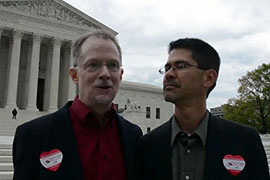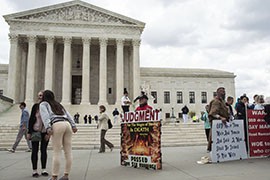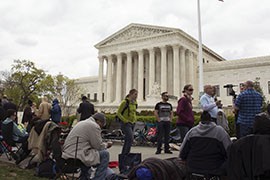Cronkite News has moved to a new home at cronkitenews.azpbs.org. Use this site to search archives from 2011 to May 2015. You can search the new site for current stories.
Arizona same-sex unions hang in balance as court revisits marriage bans
WASHINGTON – Hundreds of Arizona couples have taken the plunge since the state’s ban on same-sex marriage was lifted in October, but their unions could be thrown up in the air as the Supreme Court revisits the question Tuesday.
The same nine justices who overturned a federal ban on same-sex marriage in 2013 will consider whether state bans are constitutional and whether states that do not allow such marriages must recognize those performed in other states.
It was that 2013 ruling that sparked a string of lower courts to overturn state same-sex marriage bans, including the 9th U.S. Circuit Court of Appeals which ruled in October that states in the circuit – including Arizona – could not prohibit such marriages. Thirty-six states now recognize same-sex marriage.
“Thirty-six states have marriage equality already, and the sky has not fallen,” said Kelley Dupps, a volunteer with Human and Equal Rights Organizers, a lesbian, gay, bisexual and transgender advocacy group in Phoenix. “Equality is not all that ridiculous.”
But opponents to same-sex marriage do not believe the Supreme Court should get to “redefine marriage.”
“From our perspective there is no constitutional mandate that marriage be redefined,” said Josh Kredit, legal counsel for the Center for Arizona Policy. “There is an ongoing discussion about what the purpose of marriage is, what marriage means, what it does not mean, and I think leaving that to the democratic process is the way that it should go.”
Hundreds rushed to Arizona courthouses in the weeks after former Arizona Attorney General Tom Horne said he would not challenge the 9th Circuit’s decision overturning the state’s same-sex marriage ban.
Not all county clerks in the state were able to provide a definitive number of same-sex couples who have received marriage licenses since then. But the nine that could provide numbers reported issuing close to 200 such licenses – and those did not include Maricopa and Pima counties, which together account for three-quarters of the state’s population.
HERO estimates that 600 couples married within a few months of the decision and many more who had married out of state saw their marriages recognized.
Arizona Attorney General Mark Brnovich has joined other states backing a Louisiana brief that urges the justices to allow states to decide the issue of same-sex marriage. Phoenix Mayor Greg Stanton, Tucson Mayor Jonathan Rothschild and Tempe Mayor Mark Mitchell, meanwhile, have signed onto a brief of 226 mayors in support of same-sex marriage.
For many opponents, the issue of same-sex marriage has taken on the mantle of state’s rights.
“States having millions of votes overturned by nine unelected judges, there’s something very undemocratic about that,” Kredit said. “We should defer to states … if they want to redefine marriage, then the state should decide that.”
But advocates of same-sex marriage say the “patchwork” of laws that have resulted from states deciding the issue is unconstitutional.
“It can’t be a patchwork where you’re married here and then you cross a state line and you’re not married there. You need to be married in all 50 of these United States,” said Stuart Gaffney, communications director for Marriage Equality USA.
Advocates are hopeful. They point to previous Supreme Court decisions overturning interracial marriage bans, anti-sodomy laws – and this court’s 2013 decision overturning the federal same-sex marriage ban as positive signs.
“We’re very hopeful. It’s not a legal precedent but we’re hopeful that with our nation the momentum is in favor of equality, and we believe the momentum of the Supreme Court is also in favor of equality,” said John Lewis, director of legal and policy at Marriage Equality USA.
Lewis and his husband, Gaffney, were plaintiffs in the California case that was one of two the Supreme Court ruled on in 2013, establishing the right of same-sex couples to marry. The couple traveled from San Francisco to Washington, along with Marriage Equality USA members from around the country to show support Monday for LGBT rights on the steps of the Supreme Court.
“Being able to get married not just in the eyes of the law but in front of our family and friends who are nearest and dearest, was one of the happiest days of our lives together,” Gaffney said. “That meant the world to us, but it didn’t take anything away from anybody else.”
Dupps said LGBT people can no longer be treated as “second-class citizens” under the law and that her life changed in October when Arizona recognized her and her wife’s marriage.
“Waking up on Oct. 17, 2014, and having my marriage recognized in Arizona was a fulfilling day,” Dupps said. “Folks saw you in a different light. They recognized that this was important, because no matter what your orientation is you understand the profound meaning of marriage.”










